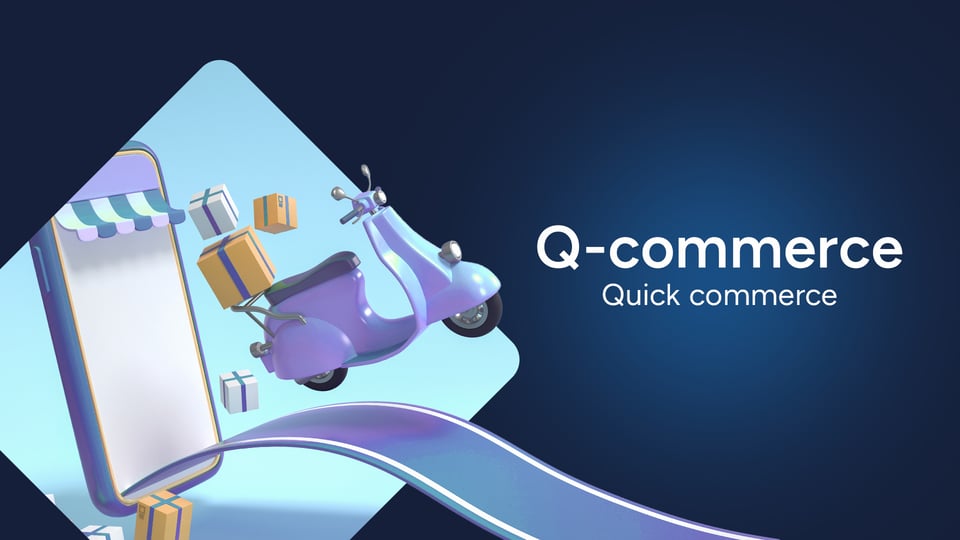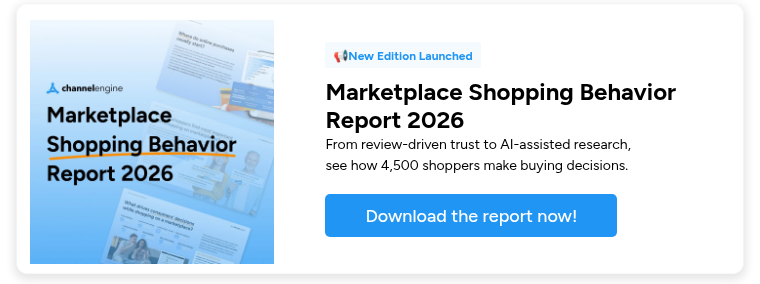Quick commerce redefines the future of shopping

Speed plays an essential role in the modern customer journey. Quickness and convenience are what customers crave and this is where quick commerce enters the picture. What started as a trend influenced during the COVID-19 pandemic, quick commerce is growing to meet the needs of our fast-paced lives.
Read on to learn what quick commerce is, how it differs from ecommerce, examples of companies offering it, and its benefits for both consumers and businesses.
What is quick commerce?
Quick commerce, also called Q-commerce, is an emerging business model that delivers products or services within 10-30 minutes after the customer places their order.
Referred to interchangeably with "on-demand delivery" and considered the third generation of trade, it tends to focus on smaller quantities of goods, such as groceries, medications, and other everyday essentials and staple items, like toiletries.
As its name indicates, Q-commerce is all about quickness. Sales are made online, then goods are delivered exceptionally fast. Businesses can make this happen by shifting from traditional warehouses located on the outskirts to micro-warehouses situated near the delivery point, stocking only the highest-demand products.
Businesses implementing the Q-commerce model have micro-fulfillment centers located in big cities, typically close to large apartment complexes or densely populated neighborhoods. They are in repurposed retail spaces set up as dark stores. This is where delivery drivers and couriers pick up customers' online purchases and then deliver to their doorsteps within minutes.
Quick commerce vs. ecommerce
Q-commerce may look like a quicker version of ecommerce, but when you dive deeper, it's evident that there are significant differences between the two, especially when comparing warehousing, quantity, choice of items stocked, transport of goods, and delivery times.
- Warehouses: ecommerce companies tend to use large warehouses located on the outskirts of a city, where operating costs are lower. Q-commerce warehouses are dark stores, which are much smaller and located in close proximity to where customers live.
- Items stocked: ecommerce sellers can offer a wide range of products, and although orders are fulfilled at warehouses further away, orders can still reach customers within a specified delivery timeframe, which is usually a few days. But with Q-commerce, the product range is much smaller and more specific, so all items are available immediately upon order.
- Transport: ecommerce orders are transported by delivery trucks and commercial parcel services. Q-commerce uses smaller means of transportation, like bicycles or scooters, which can avoid traffic, speeding up delivery times.
- Delivery times: ecommerce calculates delivery time in days. Q-commerce comes with the guarantee that goods will be delivered within minutes.
Examples of quick commerce
Now that you understand what quick commerce entails let's look at some examples of leaders in the Q-commerce space.
Getir
Getir is based in Istanbul and was launched as an app in 2015, revolutionizing on-demand delivery with its “groceries in minutes” value proposition. Today, Getir offers approximately 2,000 food and grocery items to customers in Turkey, the UK, the Netherlands, Germany, France, Spain, Portugal, and the US.
Gopuff
Founded in 2013 in Philadelphia, Gopuff brings food, snacks, alcohol, and other home essentials to customers within minutes and for as little as USD 3.95 an order. The company stores 4,000 products in each of its hundreds of local micro-fulfillment centers and delivers to customers across the US and UK.
Deliveroo
Based in the UK and founded in 2013, Deliveroo connects local consumers, restaurants and grocers, and riders for food orders fulfilled in under 30 minutes. Now operating in 10 markets worldwide, it delivers takeaway food, groceries, coffee, and more to the front door of millions of consumers who have access to Deliveroo's 158,000 global restaurant partners and 18,000 global grocery partners.
Gorillas
Founded in 2020 in Berlin, Gorillas’ mission is “to change the way that you do groceries” by offering high-quality, locally sourced produce, dairy, vegan, and drink items. The company puts a strong emphasis on responsibility, highlighting how delivery on-demand leads to less food waste, using bikes for delivery versus customers driving to stores reduces emissions, and its micro-fulfillment centers free up land traditionally used for supermarkets and parking lots.
DoorDash
DoorDash was launched in 2013 in San Francisco as an online food delivery platform, and by 2019, it was the largest food delivery provider in the US based on consumer spending. The company went public in 2020 and now operates in the US, Canada, Australia, Japan, Germany, and New Zealand. What started as door-to-door food delivery, DoorDash now delivers goods from local convenience stores, pet stores, grocery stores, and more to millions of customers worldwide.
Benefits of q-commerce
The most significant benefit of quick commerce is pretty straightforward¾it’s ultra-quick. But the advantages don’t stop there. Here are some other benefits of this business model for retailers and consumers.
Ultimate customer experience
In addition to providing customers with unmatched convenience, Q-commerce businesses address customer pain points head-on. Let's say you started cooking and suddenly realize you don't have an ingredient on hand. Or invite friends back to your place after a night out but have no alcoholic beverages in your fridge. Quick commerce saves the day by delivering solutions that drive customer satisfaction, trust, and loyalty.
A competitive USP
Q-commerce delivers a unique value proposition that other ecommerce marketplaces cannot yet compete with. When it comes to food deliveries, customers demand fast and easy, and that is the bread-and-butter for many Q-commerce companies. The ability to deliver goods 24 hours a day is another area where quick commerce has the competitive edge over brick-and-mortar stores and online marketplaces like Amazon and Walmart.
Potential for higher profits
Convenience is a luxury that consumers are willingly paying more for. According to a study by Deloitte, during the pandemic, more than 50% of consumers spent more on convenience to get what they need, with “convenience” increasingly being defined by contactless shopping, on-demand fulfillment, and inventory availability.
Q-commerce certainly appeals to wealthier consumers (think busy professionals), and this group tends to value convenience over discounts. That allows retailers to drive sales for their most profitable items.
Final thoughts
Consumers today demand instant, customer-centric service, with convenience being a prime factor in the shopping journey. As an emerging business model that meets customer needs, provides solutions and saves people time, quick commerce is well-positioned to become the future of online shopping.
Contact us to explore how our solutions can help your company



.png?width=360&height=202&name=Marketplace%20Talk%20jan2026%20(1).png)